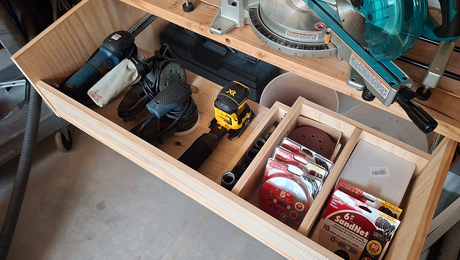G’day all
I am extending my workshop and would like to have windows at high level on the walls to provide lots of natural light. I was thinking of making these with two panes of 3mm glass ( 1/8″ ) in a timber frame with a rebate either side to provide an air gap of around 11/4 ” and fixing the glass in place with silicone.
Can anyone provide advice on my proposal.
I realise there are lots of double glazed windows, or the glass units available, but don’t want to spend lots of money on the workshop if I can get good performance out of self made windows.
Regards



















Replies
You don't say where you live, but in many climates your DIY double glaze will be constantly fogged. (In cooler climates you can reduce the fogging somewhat by having small vents between the center in the outside, though.) But in any event, be sure that the glass on one side can be easily removed to allow cleaning from time to time.
You might want to ask around: In many cases when commercial buildings get remodeled the old window inserts are just trashed. You might be able to pick up something free or very cheap.
Well the air gap will offer some insulation value but not the same as a factory sealed unit filled with a inert gas. but it will be better then a single pain. Also you may get moisture problems between the glass unless you completely seal the space between the glass (the wood frame will still let in moisture) the best way to do it would be get your two pieces of glass and a spacer that goes completely around and seal the two pieces of glass to the spacer then seal the entire perimeter of the glass let it dry then install it in the wood frame then the moisture in the frame can not get between the glass.
But even that may not be perfect because you have no way to evacuate the air as you seal the two pains but if it gets real dry in your area in the winter (indoor heated spaced in cold climates usually get very dry) it may be moisture free enough.
Depending on the size a pre sealed double pain unit (just glass spacer and sealed) is not that expensive (unless you want low-e glassing that or other high tech coatings that work to reflect heat gain in the summer yet allow it in during the winter.
And it is guaranteed to offer a given R-value
Table One - GLASS R VALUES
Type of Glass R Value
Single Pane regular glass 0.85
Clear Insulated Glass 7/8 inch overall thickness 2.08
Hard Coat Low-E insulated glass 2.45
Hard Coat Low-E insulated glass with argon 2.75
Soft Coat Low-E insulated Glass 3.50
Soft Coat Low-E insulated glass with argon 4.35
Now I do have a question are you heating or cooling the space? is the rest of the wall insulated?
If so to not invest in a insulated glass now will cost you later. But if not then don't worry just make sure you eliminate drafts and you should be fine. And if the windows face south they could offer some free passive solar heat.
Double glazed fixed window
Thank you for the feedback. I live in an area south of Sydney with hot summers and cool winters. I will most likely have some form of heating in the winter but don't really want to install A/C unless I have to, but I plan to fully insulate. Reading your comments it sounds like my plan is not going to be all that successful & I need to either purchase double glazed units and install in a frame or simply go with single glazing.
Thanks again
Regards
home made double glaze window
It is risky, I think. I tried just that, buying spacer and dehumidifying granules from the glass supplier. The granules go into the perforated spacers. It fogged between the 2 glass panes. I used silicon caulk. I don't know how it is done at the factories but probably this should be done where the humidity is controlled.
Before you make double pane window, I would further study the R-value of single vs. double and consider the cost. I think you would benefit more from air leak control and wall insulation. Good luck.
There's no way you can seal a window well enough to keep humidity out. A controlled leak is the better approach -- allow a little air exchange between the middle and the drier side.
how are your windows working out?
hey junkhound, i'm currently building myself a workshop (in seattle) and am working on my window stratagy. since the windows need to kill sound, i am looking at building them myself, using heavier glass and wider spacing than the window companies will generally make as a sealed unit. just wondering how well your (or anyone elses) self made window units have performed over the years. any issues? would you do it again? any tips?
thanks
lotek
If you are concerned w/sound transmission-
Split the jambs and join them with a vibration reducing strip.
Tilt one or both panes so not parallel to each other.